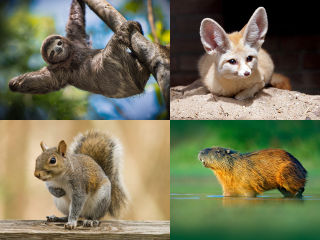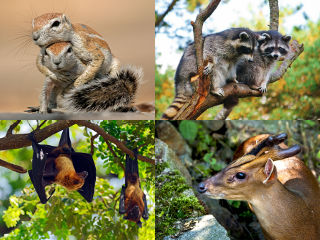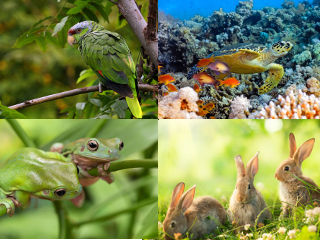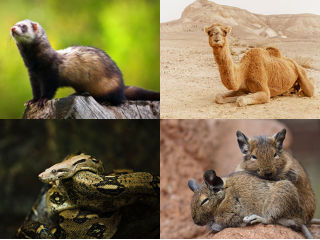Most animal lovers have dreams of owning a unique and exotic animal. Who wouldn't love a pet as cool as a Kinkajou? It is important to remember, however, to always know the laws around animal ownership in your state, city, county, or township and to do plenty of research beforehand to ensure you can provide an amazing home for these beautiful creatures.
Remember that any animal you bring under your care, whether a dog or a bat, is a big commitment. But owning exotic animals in Florida can be a rewarding experience for many. With any luck, you might just find the animal you're looking for!
Classes of animals in Florida
Before we get started talking about the legal exotic animals you can own in Florida, let's first go over a couple of the laws associated with keeping some of the more exotic animals. In Florida, there are three different classes of animals. Class I, Class II, and Class III. Class I animals include animals that present a risk to human safety. These ones definitely cannot be kept as pets. Some examples include large cats, baboons, gorillas, bears, rhinoceros, and elephants, just to name a few. Institutions like zoos and sanctuaries can, of course, apply for a license, but the process is highly regulated.
Class II animals are typically defined as animals that may present a real or potential threat to human safety. However, they can be kept as pets with a permit/license. But to get one of these, you have to show that you have plenty of experience and have the proper means to provide a good and safe habitat for the animal. The license costs 140 dollars every year. Some examples of Class II animals in Florida include coyotes, jackals, badgers, wolverines, servals, caracals, and more.
Class III wildlife includes just about every other animal that isn't categorized into class I or class II. Many don't require a permit, but some do. For example, animals like the kinkajou, capuchin monkey, spider monkey, skunk, raccoon, etc., require a permit but at no cost to you. The permit lasts two years. For some, like the capuchin, spider monkey, and woolly monkey, getting a permit can require quite a bit of work. You'll have to prove you have the necessary experience with the animal and proper habitat setup. Others that don't require a permit could be parrots, parakeets, most reptile species, and all amphibian species.
Bats (Class III - No Permit Required)
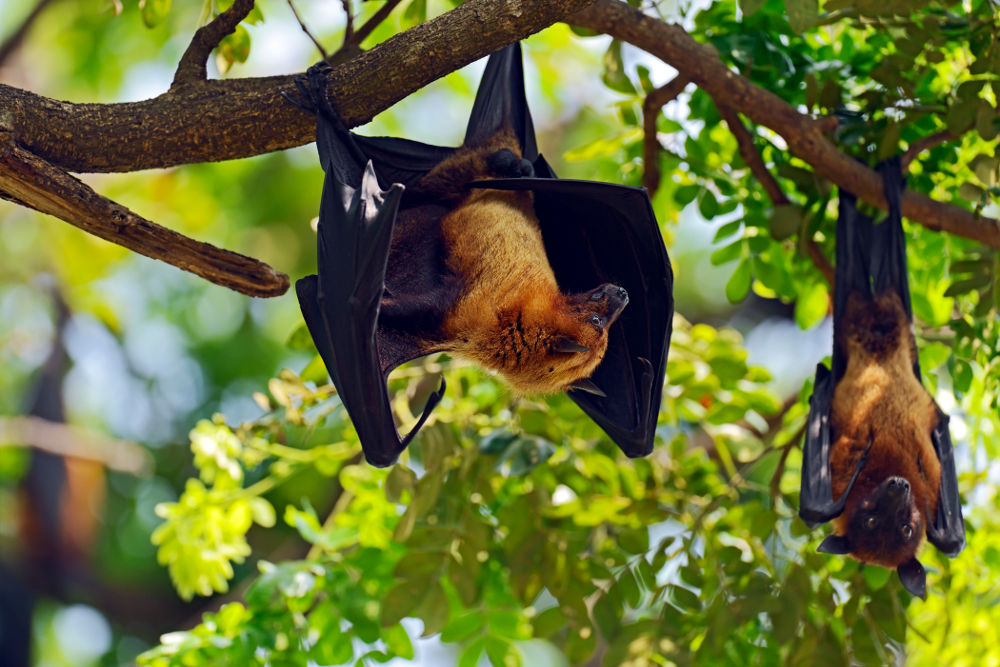
Some people like to keep fruit bats as pets in Florida. They'll need lots of space to fly around in. Though it should go without saying, don't take a bat from the wild since they can have diseases. Instead, it is best to contact a professional. Unfortunately, as much as people want to help, most are not allowed to keep an injured, orphaned, or abandoned animal from the wild. They have to be captive-bred if you are applying for one as a pet. If you do find one in the wild who has been injured, contact a permitted wildlife rehabilitator to take the animal in.
Most interestingly, fruit bats actually help their local ecosystem! They help disperse seeds by eliminating undigested seeds and pollen, thereby allowing new plants to grow. Fun fact, bats are the only mammal capable of flight. Another name for them is the flying fox. And also interestingly enough, they are the only family of bats that don't rely on echolocation and instead rely on their hearing and their vision.
Instead of chomping down on the fruit, they actually use their teeth to bite into it and then suck the juice out. They primarily eat fruit but sometimes will eat nectar, seeds, and pollen. Fruit bats are social creatures and do best when they are with their own groups. Unfortunately, though they can legally be kept in Florida, they never seem to thrive in a domesticated or captive setting. They live much longer and happier lives in the wild.
Muntjac deer (Class III- No Permit Required)
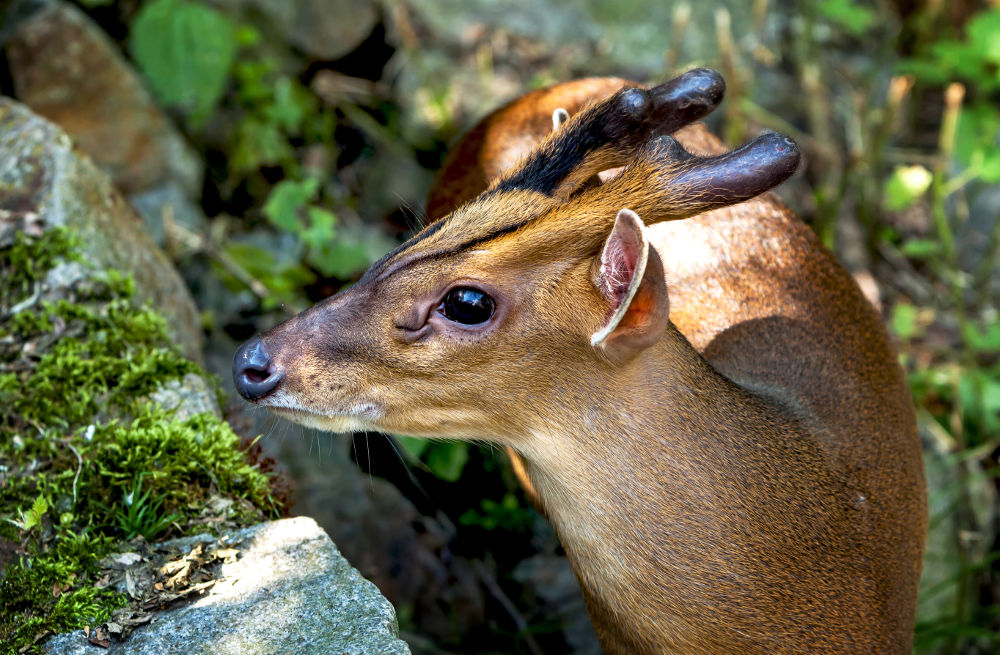
Muntjac deer are a small deer native to various parts of the world, including China, Pakistan, France, and Germany. They only reach the size of a medium-sized dog. Speaking of dogs, they are often called the barking deer because of their dog-like calls! Many people describe them as well-mannered enough to live in the home.
On average, they can live between ten and thirteen years, but in captivity or in the care of humans, they can live a bit longer. When raised among humans, they are known to be very affectionate and love to rub their heads up on their owners. They actually have scent glands on their heads, so they are kind of marking or claiming their owners as their own or claiming possession over them.
They are actually quite smart and pick up on house training very quickly. Best of all, their poop doesn't smell all that bad! And they have really tiny feet! Their tiny footprints only measure about 2.5 cm long! Another interesting fact is that they are actually the oldest known deer. Evidence of their existence can be dated as far back as 15 to 35 million years ago! There are believed to be seven different variations of the Muntjac deer. Most have a hunched-back appearance, as well as long canine teeth that protrude past the upper lip and are visible.
Squirrels (Class III - No Permit Required)
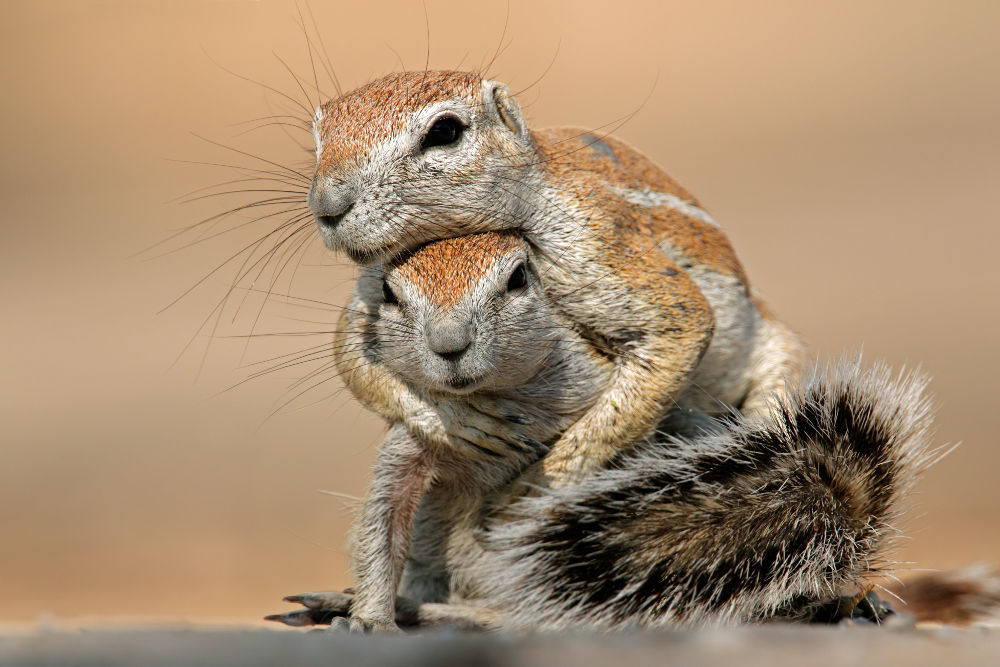
Types of squirrels allowed include red squirrels, flying squirrels, chipmunks, and Prevost squirrels. Squirrels are considered a class III animal in Florida, meaning that they are considered wildlife. However, squirrels are one of the exceptions in that it is not required to obtain a permit to own one.
Squirrels actually used to be one of the most popular pets for wealthy Americans in colonial times. However, squirrels can be very energetic and even sometimes destructive little creatures, so it's best to consider carefully if you really want one in your home chewing up your furniture! Their teeth actually never stop growing, so they need to frequently chew on things to keep them from becoming too long. Moreover, their teeth are incredibly sharp, and they don't develop or learn bite inhibition, so when they inevitably bite, they bite hard!
There are some cases of people owning squirrels successfully in the home, but they all admit that they are a ton of work! Though they are intelligent creatures, they can't be potty trained in the same way a dog or cat can. They also require a fairly particular diet in which their seeds, fruits, nuts, and vegetables all need to be fresh and organic. Squirrels also need tons of room to run, roam, climb, and play. A large outdoor enclosure would be ideal, but they can be in the house so long as it is completely squirrel proofed.
Honey possums (Class III-No Permit Required)
These adorable tiny creatures are known to be the smallest marsupial in the world. In fact, they are about half the size of a mouse! They are native to Australia and are believed to be the last descendants of a now extinct group of marsupials. They are nectarivorous, which means that they eat a diet of mainly nectar and pollen. They have a long, pointed nose and a long tongue so they can get into all the nooks and crannies they need to get their food out.
They are highly social animals and usually do best in groups of other honey possums. They normally sleep during the day and feed at night but are sometimes known to grab a snack or two during the day. They can actually go into hibernation when the weather cools or if food is scarce. In hibernation, their metabolism slows down, and body temperature decreases.
Among mammals, they actually have the smallest newborns of all, with a newborn being as small as a grain of rice, or about 0.005 g. When they are fully grown, they still only weigh between 7 and 10 grams! They have a prehensile tail meaning that they can hold onto or grasp objects. Many times honey possums can be seen hanging upside down on plants or flowers, gripping the branch or stem with their tail!
Kinkajous (Class III - Permit Required)
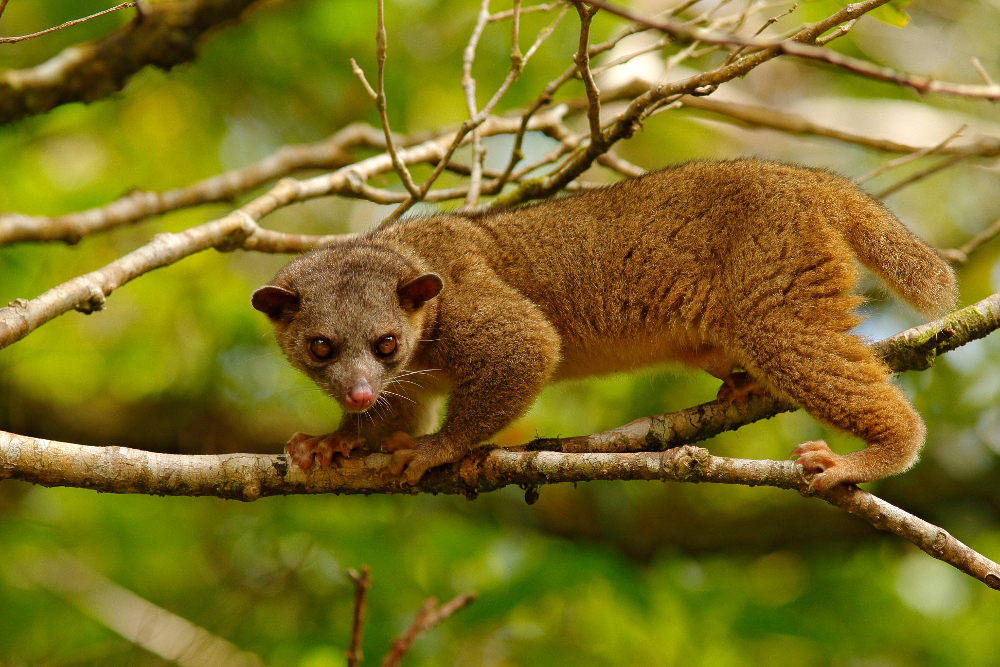
Kinkajous, whose name translated means "honey bear," are animals that are native to the tropical rainforests of Southern Mexico and Brazil. As the name suggests, they love honey! Kinkajous are notorious for having a sweet tooth. They love to get honey out of beehives. Though some may describe them as being similar in looks to a monkey, they are actually not primates at all. Instead, they are more closely related to raccoons and coatimundis.
Kinkajous are naturally nocturnal and arboreal. Arboreal means that they get around by jumping from tree to tree high in the canopy of the rainforest rather than being on the ground. Though they love their honey, they are technically carnivores due to occasionally using their canine teeth to eat eggs, hatchlings, and insects. But primarily, they love to eat fruit, honey, and nectar.
Kinkajous are surprisingly smart and strong-willed animals. Like many animals on this list, owners will have to completely baby-proof their home to protect their home and the kinkajou from getting damaged or getting into trouble. Many people call kinkajous little thieves since they'll take something, often obsess over it, and refuse to give it back. These animals are definitely not for beginners as they are mischievous and are known to live a very long life in captivity. They generally live about 20 to 25 years but, in some cases, have grown as old as 40 years old.
Sugar Glider (Class III - No Permit Required)
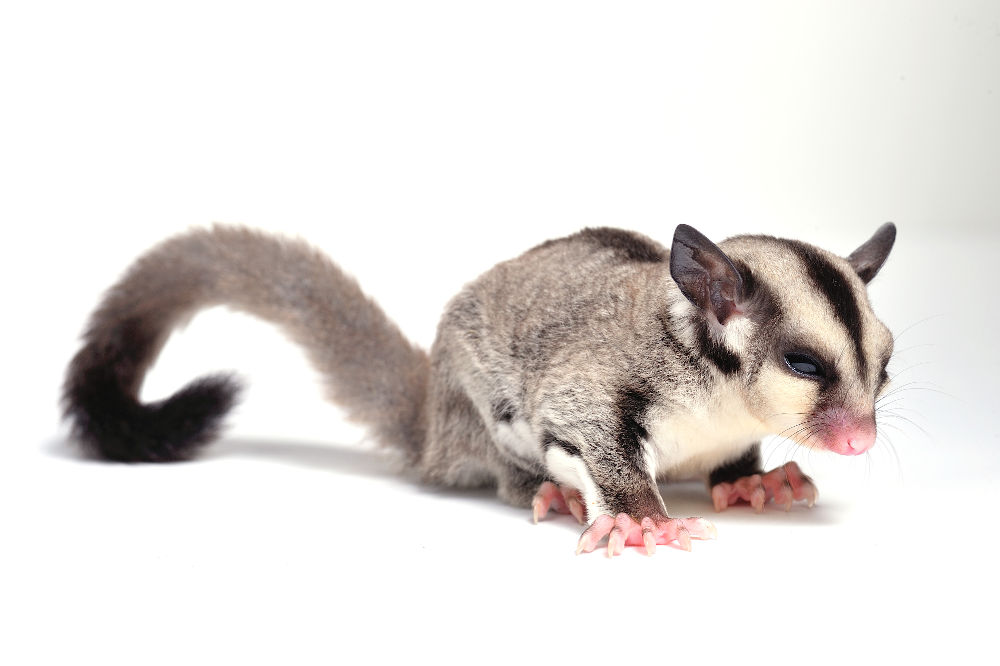
Sugar gliders, though not for beginners, are one of the more popular exotic pets on this list. The main reason for their popularity is because of how small and cute they are! Though similar to squirrels, these animals are actually marsupials. They are known for their big dark eyes, gray fur, and black markings. They are called sugar gliders because of the way they can seemingly glide through the air as they jump from tree to tree in their native Australia and Indonesia. This gliding ability is due to their having a thin, skin-like gliding membrane that acts like wings by extending from the front and back limbs on each side of the sugar gliders' body. While they do well in human care and typically make wonderful pets, they are not for beginners. They require a specific omnivorous diet made up of plants, fruits, insects, nectar, sap, and even small birds.
Another aspect to consider is that they can easily become stressed. Loud activity and noises, especially during daytime hours, the time they most often sleep, can be incredibly stressful for them. When they are stressed, there is an increased risk that they will suffer from self-mutilation as a result from scratching and chewing at their skin and fur. They also have quite a sweet tooth and can easily become malnourished and develop dental disease if not given an appropriate diet. However, when they are properly cared for, these adorable creatures can live anywhere from ten to fifteen years.
Prairie dogs (Class III - No Permit Required)
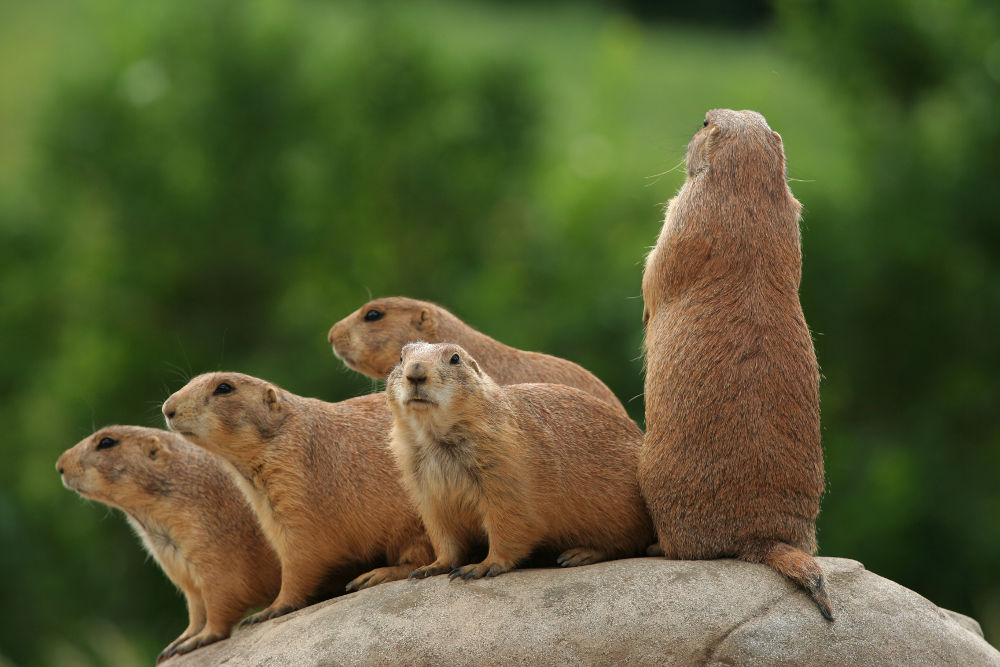
Prairie dogs can surprisingly make a good unique pet. They can get a little bit nippy and aggressive, but that's usually only if they are bored. They require more care than any average pet but make quite a good pet for those who like rodents and are willing to put in the work! Prairie dogs are also highly social animals and should never be left alone without a companion. They usually do best in pairs or groups. Pairs can include two spayed or unspayed females, or a neutered male, and a spayed female.
When properly cared for, prairie dogs in captivity can live between eight and ten years. These little guys can easily become obese due to inadequate diets and overeating. It'll be important to provide them with high-quality Timothy hay, Orchard grass, and Brome hay. They also enjoy eating fresh fruits and vegetables as special treats. They also need plenty of room to run around and exercise to keep any extra weight off.
Best of all, though, prairie dogs can be litterbox trained just like a cat! Interestingly enough, they actually are known to dig community latrines in their wild habitats from themselves and their companions. While they can make good pets, prairie dogs aren't often recommended for beginners as they are a more unusual pet to have and do require specialized veterinary care from a veterinarian trained in their care requirements.
Asian Leopard Cats (Class III - Permit may be required)
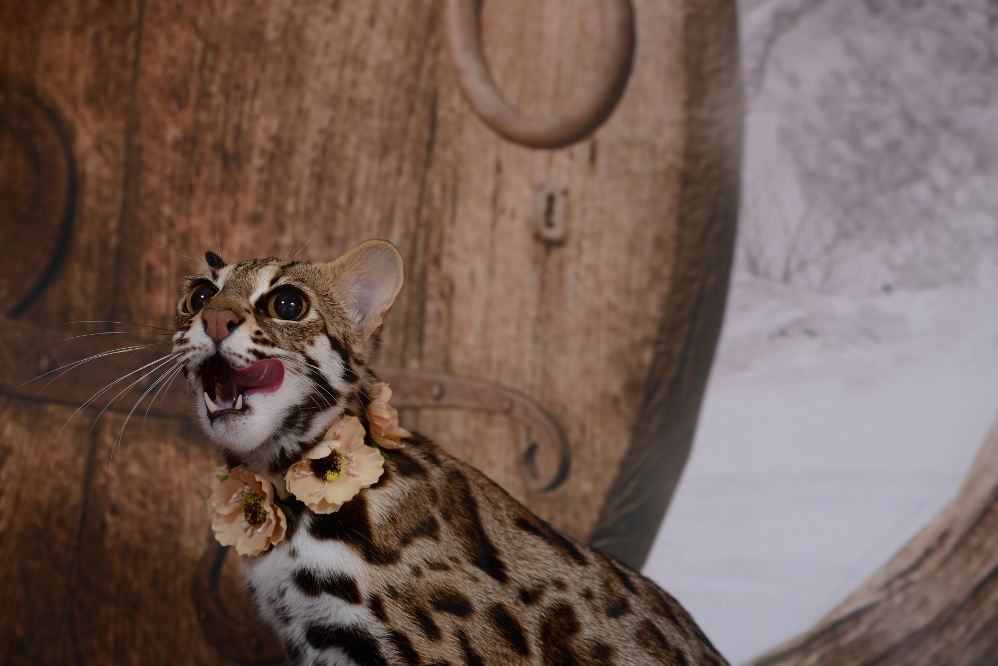
Asian Leopard Cats are another example of exotic animals in Florida that are legal to own. They are actually the ancestor of the fully domesticated Bengal cat. In 1963, one breeder decided to cross domestic cats with the Asian Leopard Cat to make the Bengal! However, it is slowly becoming more popular for people to want the Asian Leopard Cats themselves as pets. And while not for beginners by any means, they can sometimes make for good companions, though many people prefer the Bengal since it is fully domesticated. The Asian Leopard Cat, though, typically weighs between 8 and 15 pounds and has a distinctively beautiful coat with elongated spots and some stripes.
These cats are known to eat small prey like birds, rodents, some amphibians, reptiles, fish, and insects. Unlike many cats that like to play with their food before killing it, these hunters tend to waste no time and go straight for the kill. Asian Leopard Cats, as well as Bengals, are actually one of very few cats that actually enjoy the water and are confident swimmers. In the wild, they are known for being adept at hunting for fish and shellfish.
What's also interesting to know about the Asian Leopard Cat is that humans first began trying to domesticate them about 5,000 years ago. However, they eventually stopped and switched to a different cat to domesticate. These people probably chose to pursue domesticating another cat because of the Asian Leopard Cats' shy, elusive, and wary nature.
Skunks (Class III - Permit Required)
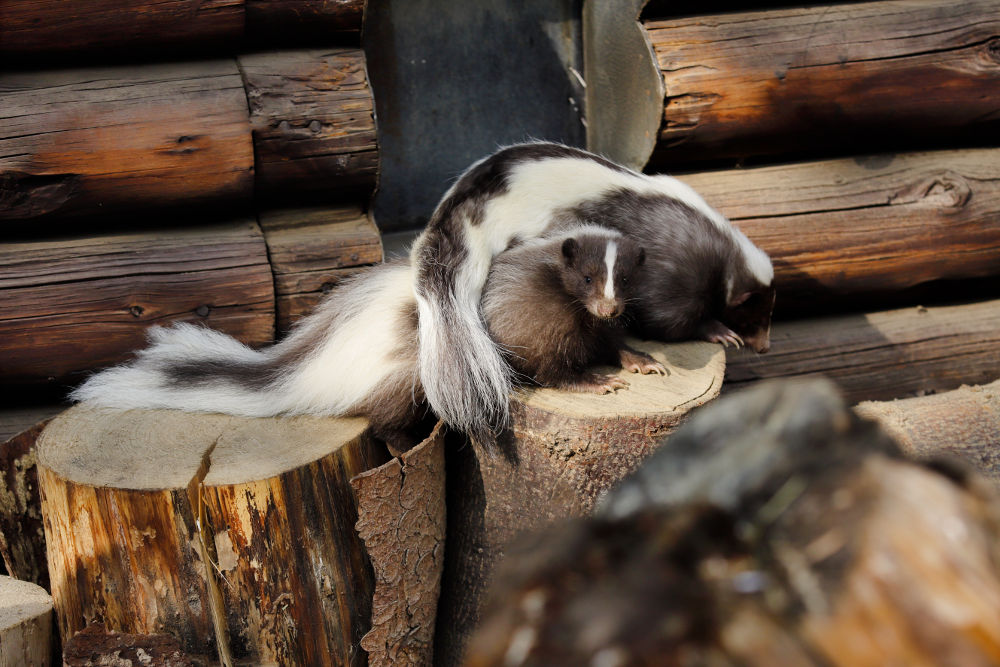
Skunks are another animal that can be kept as a pet. In fact, many local pet shops in Florida sell captive-bred babies. When they are raised by humans as babies, they often become incredibly sociable and friendly with humans. Many will even snuggle right up next to you for cuddles. While they can be kept as pets, there is no kibble for skunks, so providing a nutritious diet will be a bit harder for them than for other, more common pets. In the wild, they eat anything from crickets to beetles to carrion and even bees. They'll also eat fruit, some vegetables, rodents, and eggs. It's best to try to mimic their natural diet as best as possible, so aim for fresh fruit and vegetables as well as some meat options for protein.
In addition to adopting a skunk as a baby, you can also adopt an adult one from local skunk rescues. Skunks are considered class three in Florida and are one of the animals that require a permit though they aren't particularly hard to get in the case of a skunk. Skunks do require specialty veterinary care, so it will be important to make sure you have access to a veterinarian with knowledge of how to care for skunks.
Raccoons (Class III - Permit Required)
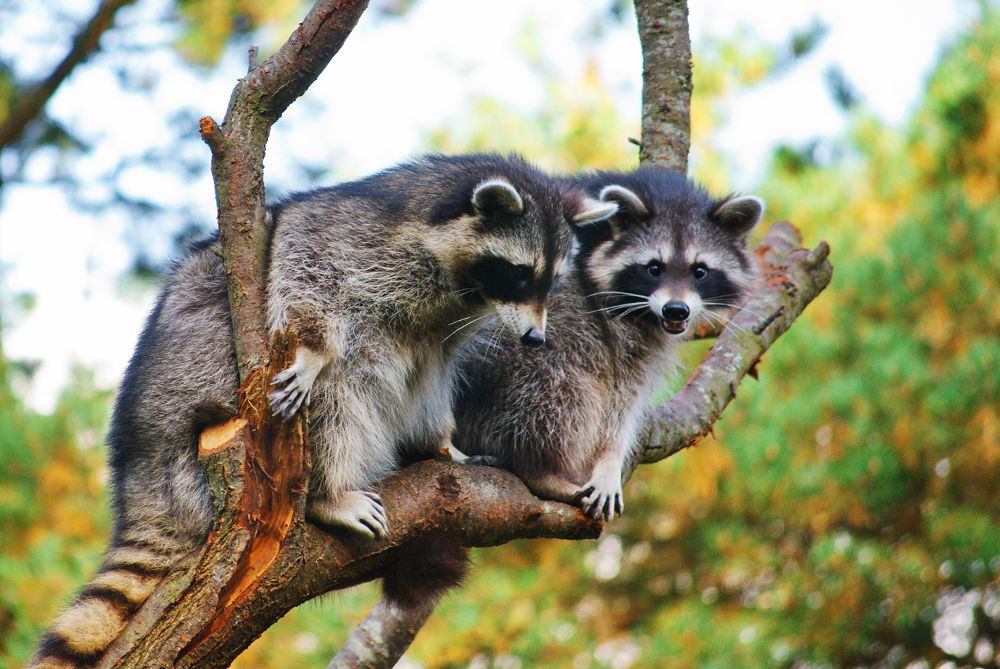
Captive-bred raccoons are another animal that can be kept legally in Florida. In fact, when raised among humans, they can actually be quite affectionate and cuddly! However, raccoons start the process of reaching sexual maturity as young as six months of age. All those hormones can result in a sudden personality change in the animal, which often includes aggression.
If someone were to take in a raccoon at a young age, it would be very important to get it to a veterinarian specialist who can provide preventative care and get it spayed or neutered. They won't hesitate to bite or scratch once they reach sexual maturity, and both their teeth and their claws are like razor blades and can do some serious damage.
Things to remember
Now that we have mentioned the top ten legal exotic animals in Florida, are there any that really caught your eye? While these animals sure are cute, they all require a ton of work and effort. Make sure you extensively research the needs and requirements of any animal you choose to bring home so you can ensure that you are able to provide the kind of life and care it needs.
Also, be sure to check your local cities, towns, and counties for rules regarding the laws around ownership of the animal you are interested in. Though it may be allowed by the state, some cities or counties may have different laws and regulations. It's best to call or go to your local government office and ensure that it is possible to have the pet of your choice in your area.
The last thing to remember is to make sure you have an exotic veterinarian who is willing and able to provide quality care for your new exotic pet. Once all these things have been established, it is time to start looking for your new pet!
Final Thoughts
Adopting an exotic animal is quite an adventure and is something that many people don't ever get to experience due to the time, effort, and dedication that goes in to owning an exotic pet. It will be important to do plenty of research on the animal you are interested in so you can provide it with an amazing home and an amazing life. No matter what kind of species, all animals deserve to have their needs met and to have a loving home. There are quite a few animals to consider, but with time, research, and preparation, you will be sure to find the perfect exotic pet for you!
FAQ
What animals does Florida have?
Florida is home to a diverse range of wildlife species, including mammals, reptiles, birds, amphibians, and various marine life. Some of the more notable animals found in Florida include:
American Alligator,
West Indian Manatee,
Florida Panther,
Bottlenose Dolphin,
Key Deer,
Northern Raccoon,
Marsh Rabbit,
Gray Fox,
Eastern Cottontail,
American Black Bear,
Nine-banded Armadillo,
Gopher Tortoise,
Eastern Diamondback Rattlesnake,
Osprey,
Bald Eagle,
Roseate Spoonbill,
Anhinga,
Brown Pelican,
Reddish Egret,
Wood Stork,
Burrowing Owl,
Green Tree Frog,
Cuban Tree Frog,
Southern Toad,
Eastern Indigo Snake
What animal is most likely to kill you in Florida?
While the likelihood of being killed by an animal in Florida is relatively low, the most dangerous animals in the state are typically those that can cause harm to humans through bites, stings, or attacks. The animal most likely to pose a threat to humans in Florida is the American alligator.
American alligators are large reptiles that can be found in various freshwater habitats throughout Florida, including swamps, marshes, rivers, and lakes. Although they generally avoid humans, alligators can become aggressive if they feel threatened or if they associate humans with food. Attacks on humans are rare but can be deadly due to the alligator's powerful bite and size.
Other potentially dangerous animals in Florida include:
Eastern Diamondback Rattlesnake: Venomous snake that can deliver a potent bite if disturbed or threatened.
Florida Cottonmouth (Water Moccasin): Another venomous snake that can be aggressive when threatened.
Southern Black Widow Spider: Venomous spider with a painful and potentially dangerous bite, though fatalities are very rare.
Florida Panther: Large and powerful predator; however, encounters with humans are extremely rare, and attacks are even rarer.
Sharks: While shark attacks are uncommon, Florida's coastal waters are home to various shark species, including bull sharks, tiger sharks, and blacktip sharks.



